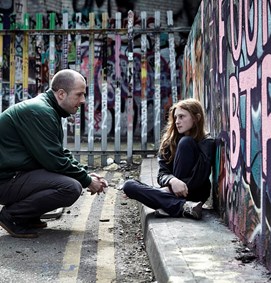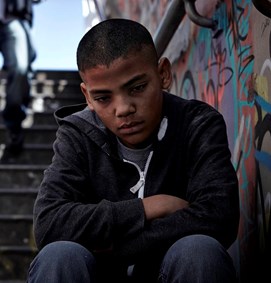A month in news: five stories on children’s rights, wellbeing and challenges from July
- Date: 10 August 2023
- In: UK

We’re kicking off our Month in News series by looking at five prominent stories that hit the headlines, both directly and indirectly related to our work at Railway Children.
Following widespread criticism from the UN, charities and campaign groups, the Illegal Migration Bill became law last month after receiving royal assent. Under the new legislation, people arriving in small boats to the UK – many of whom are refugees seeking safety – will now face detention and possible removal from the country.
Serious concerns have been raised about the damaging impact on children who are detained, and that those who have been trafficked, are fleeing abuse or persecution won’t receive the protection they need. There is also the fear that young people will be exploited by criminal gangs and disappear into society knowing that they face deportation at the age of 18.
That’s why, in July, we joined with a coalition of hundreds of organisations to sign a statement in solidarity with anyone who seeks safety in the UK.
Following reports earlier this year about professional-looking adverts on social media luring children into drug trafficking, the BBC recently did an investigation into Snapchat being used by county lines gangs to groom teenagers. Despite the app insisting that it proactively regulates content to detect and prevent drug dealing, the investigation raises the question of whether social media firms need to be doing more to protect vulnerable young people from falling into harm’s way.
Our Safeguarding Action Groups bring the rail community together to identify and respond to any concerns for the safety of children and young people on public transport, including potential victims of criminal exploitation.
Joe Swash’s poignant BBC documentary hit headlines last month after shedding light on the untold stories of teenagers in the UK care system. In the documentary, the TV personality meets young people who live in foster care and residential children’s homes, as well as 18-year-olds who have left care, to speak about the challenges they face. The documentary follows the publication of the independent review of children’s social care and highlights some of the system’s failings that Railway Children seeks to address.
We are part of the English Coalition for Runaway Children (ECRC), which aims to safeguard young people who run away or are missing, including those in care settings.
Children’s charity Barnardo’s has warned that young people are increasingly at risk of criminal and sexual exploitation during the summer holidays, as the cost-of-living crisis means they will have less adult supervision.
The charity’s latest report revealed that 6 in 10 parents won’t be able to afford to take time off work or pay for activities and clubs, putting children at a ‘greater risk of exploitation both online and in the community’ with a ‘higher likelihood they will go unidentified and unsupported’.
The report also highlights the lack of youth centres and safe spaces for children to spend time in, as well as insufficient specialist support for victims of exploitation.

As well as raising awareness of vulnerability across the rail network, our Youth Practitioners work with children, young people and their parents before, during and after they’re on the streets to help make families stronger.
Kier Starmer faced backlash from poverty campaigners and his own party for confirming they would keep the two-child benefit cap. The controversial policy, which was brought in by former Conservative Chancellor George Osborne, stops parents from claiming child tax credit or universal credit for a third or subsequent child born after April 2017.
Despite the government’s claims that the policy would encourage parents to make decisions about children based on what they could afford, research shows that it has impoverished families. There has been strong criticism of the cap since it was introduced, with many MPs and organisations calling for it to be abolished to reduce child poverty.
With the cost-of-living crisis putting more pressure on parents, we’re committed to helping rebuild families broken down by poverty and conflict using a trauma-informed approach. We offer one-to-one support with no judgement, no cost and for as long as it takes to create a safe and stable home.